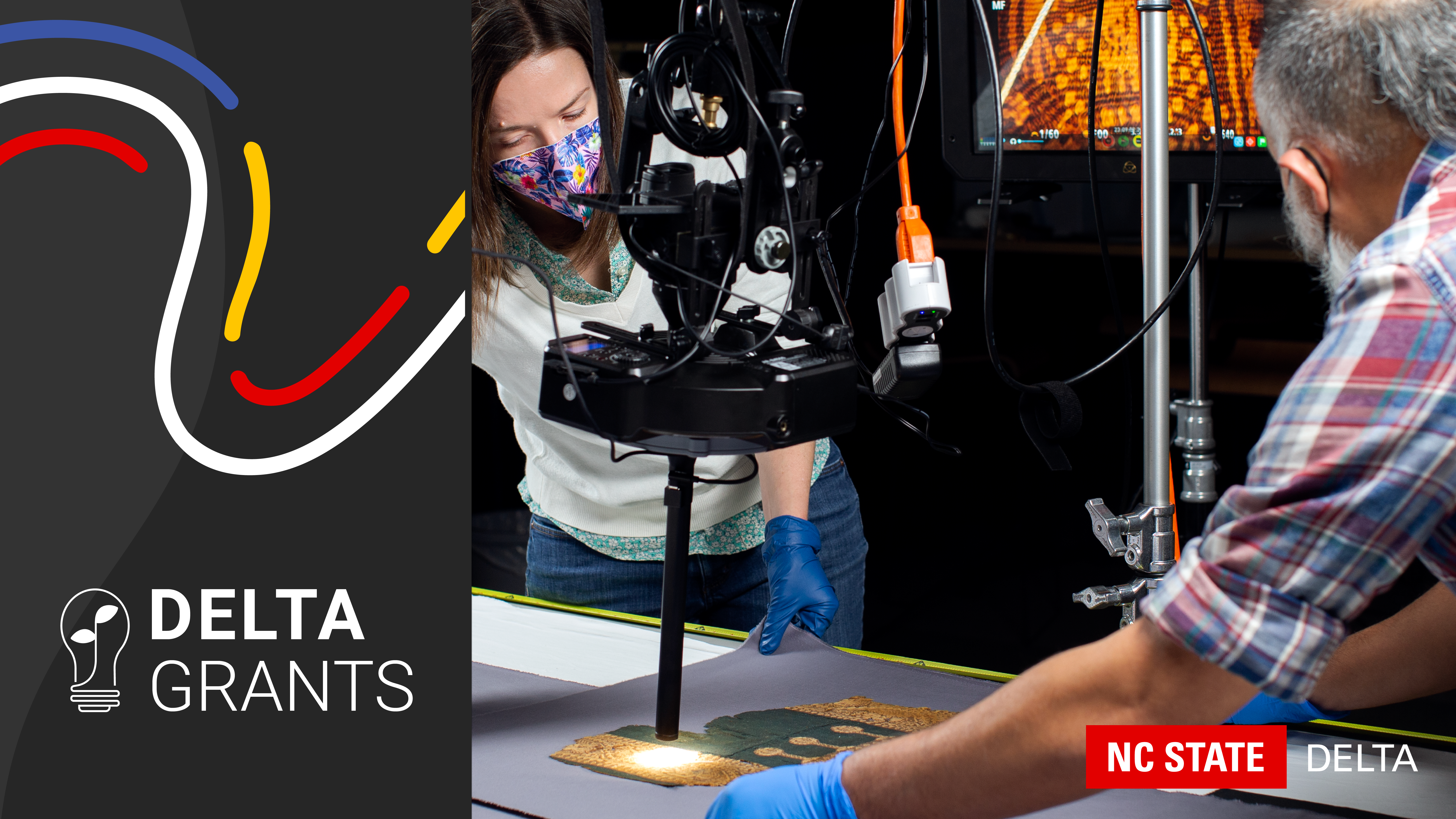Have you ever wondered if the DELTA team could help you improve your course content creation, organization and/or delivery? Many faculty members believe they must know what deliverable they need prior to attending a group consultation or applying for a grant, but that is not the case!
DELTA team members gladly meet you wherever you are in the process. They help guide you through the process with research-based solutions to instructional challenges. To demonstrate how the DELTA Grants process works, read the following examples of projects written from the perspective of the instructor — or watch the video!
When you work with the DELTA team, the process typically breaks down into the following steps:
- Explain the instructional challenge.
- Define the overview of the solution.
- Clarify the impact on students.
- Derive benefits from working with the DELTA team.
Exploratory Grant for NTR 495/594: Clinical Concepts in Human Lactation (2019-2020 Grant Cycle)
Assistant Teaching Professor Nicola Singletary applied for a DELTA Grant with a specific deliverable in mind. She wanted to create a 360° virtual reality video so her students could experience the clinical setting involved in a typical lactation consultation.
In class, she spent a lot of time discussing this consultation process and while the students grasped the concepts, they were sometimes uncomfortable with interacting with actual patients — parents and babies. So, she hoped to create a realistic experience for them to practice interactions before being in a real clinical setting.
Advice for the DELTA Grants Process: Singletary believes the best advice is to be open-minded during the collaboration process.
“You should really listen to the people on the team with expertise in different areas,” Singletary said. “For example, with the lactation videos, the clinical part of the project was my realm of expertise. I relied on the DELTA staff to show me how to set up the videos, the best way to film, and even how to incorporate them into the course.”
Instructional Challenge: How can I expose my students to the intimate nature of a lactation consultation? My students will be working very closely with new parents and babies to support breastfeeding which can be uncomfortable for an inexperienced clinical provider.
Overview of Solution: Singletary’s vision of the 360° view was expanded through the consultation with her DELTA team. With their knowledge base and understanding of her desired learning outcome for her students, they recommended a slightly different approach.
Instead of one perspective with a 360° view, multiple video angles were used including one from the perspective of the clinician. A GoPro-type of camera was mounted on the consultant’s heads. This provided different viewpoints allowing the students to become immersed in the experience. They could appreciate the proximity of the situation and how the clinician is a part of the patient’s personal space.
Two sets of videos were produced. The first video showcased the clinical visit, and was spliced into different segments. The second set focused on the thought process of the clinician demonstrating the thought process during the clinical visit that may not be voiced to the patients.
Impact on the Students: The initial 360° experience idea did not allow for a truly immersive experience for the students. The use of multiple angles provided an immersive experience showing the perspective of looking down on the baby from a very close view while also demonstrating how much movement is involved in this type of work. In other words, instead of being an observer from the outside looking in, it is a realistic vantage point of the clinician.
Benefits of Working with DELTA: Singletary approached the grant process believing she had the solution to her challenge. She quickly realized that she was now a part of a team who had expertise in videography and instructional design. The collaborative effort resulted in a slightly different end product that provided more than she initially thought was possible.
“It helped me to grow as an educator,” Singletary said. “Going forward, I can incorporate the skills I learned by working with DELTA into my other independent projects. The best thing about working with DELTA is that their insightful questions and solutions expanded my perspective. Instead of jumping right into the project, we took a step back and figured out the best way to tackle the project as a group. And, this resulted in a superior outcome for my students.”
Want to hear more from Singletary? Watch her short testimonial video.
Blended Learning Grant for ED 590 — Special Problems in Teaching and Learning: Emergency Preparedness and Crisis Response (2020-2021 Grant Cycle)
Associate Teaching Professor of Counselor Education and Faculty Fellow with the Office of Faculty Excellence Angela Smith’s first DELTA Grant was for a group counseling course in 2014 and it went so well that she continues to work with DELTA in 2023.
Before the COVID-19 pandemic, Smith teamed up with Assistant Vice Chancellor for the Division of Academic and Student Affairs Justine Hollingshead and Associate Vice Chancellor for Business Administration Barry Olson to create a one-credit, in-person pilot course on personal and professional preparedness in crisis situations. This class was offered in the College of Education in 2018 to see if there was an interest in this topic. The pilot was successful and together, they decided to expand the course content coverage and turn it into a three-credit course.
Since she valued her previous collaboration with DELTA, she knew they could help with the design and creation of course content materials.
Advice for the DELTA Grants Process: Smith believes the best advice when creating an online course is to focus on your learning outcomes and objectives with student success at the forefront of the process.
“It is best to start your online course design at a very fundamental level without trying to put all the bells and whistles in all at once,” Smith said. “Really think about what you want students to gain from this course. The newest, latest, shiniest technology deliverable in the market isn’t necessarily the best option for students. In fact, in the beginning stages of course development, learning to use advanced technology may create more challenges and anxiety while trying to learn new material. So, be intentional about the specific technology you decide to incorporate into your courses and consider your own bandwidth for learning and teaching students how to use it in the course.”
Instructional Challenge: How can the 1-credit pilot course offered in 2018 be transformed into a 3-credit graduate course? This course needed an organized structure with learning activities that would benefit both instructors and students.
Overview of Solution: The DELTA team recommended 10 high-level topics/course modules that are stored in Moodle using PlayPosit for student assignments. It can be taught during fall, spring or summer in either expanded or collapsed formats.
In addition, the goal was to expose students to first-hand knowledge about emergency preparedness and crisis management. Expert guest speakers were featured to foster engaging interactions in both synchronous and asynchronous formats. Podcasts were used and the knowledge the experts shared can be applied in personal and professional situations.
Impact on the Students: The interactive approach to assignments proved to be impactful. Students conducted interviews that left a lasting impression.
“As a staff member with the university, I appreciate the opportunity that this class has provided me to sharpen my skills and consider my own preparedness for when the unexpected occurs. Interviewing friends, colleagues and family to compare their understanding of emergencies and their own preparation was especially enlightening – everyone I interviewed confirmed that the questions asked made them think more critically about how they can better prepare. What an amazing tool that this course provides to create a campus of aware, caring professionals!” said Connor Brady, NC State University Housing.
Benefits of Working with DELTA: Smith experienced many positive interactions with DELTA and appreciates the collaborative, consistent approach to creating solutions to instructional challenges.
“DELTA team members not only listen to us — but actually hear us when we share our hopes for our projects,” Smith said. “The team offered a variety of suggestions that were evidence-based and creative. DELTA offers expertise in many areas that I am unfamiliar with. Jessica White, our instructional designer, took the time to ask thoughtful questions and sought to understand our goals and learning outcomes for the course. We value her and always appreciated her knowledge, support, and purposeful guidance. What better way to collaborate and to come up with something that’s even bigger than our wildest imagination than to partner with DELTA? If and when you decide to partner with DELTA, you are welcomed as a teammate with a common goal.”
Want to hear more from Smith? Watch her short testimonial video or read the 2021 DELTA News article about this course.
DELTA Grants Group Consultations and Application System is Now Open:
If you want to get feedback on your grant ideas, please schedule an online group consultation with our DELTA team members.
Interested in applying for one of the DELTA Grants? The submission system opens on April 3 at 8 a.m. and closes on May 1 at 5 p.m.



